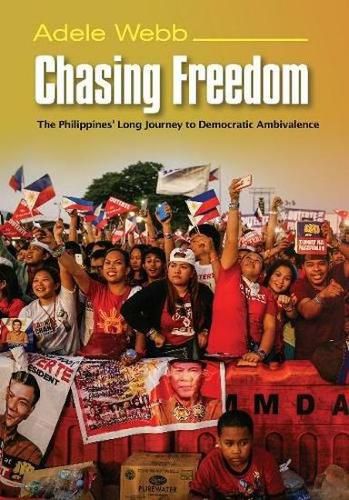Readings Newsletter
Become a Readings Member to make your shopping experience even easier.
Sign in or sign up for free!
You’re not far away from qualifying for FREE standard shipping within Australia
You’ve qualified for FREE standard shipping within Australia
The cart is loading…






How did Rodrigo Duterte earn the support of large segments of the Philippine middle class, despite imposing arbitrary authority and offering little tolerance for dissent? Has the Filipino middle class, heroes of the 1986 People Power Revolution, given up on democracy? Chasing Freedom retells the history of Philippine democracy, employing a genealogical approach that makes visible the forms of power that have shaped and constrained understandings of democracy. The book traces the attitudes of the Filipino middle class from the beginning of American colonization in 1898, to the present. It argues that democracy in country has been, and continues to be, lived in an ambivalent way a result of the contradictions inherent in Americas imperial project of democratic tutelage. Humiliation of the colonial past fuels the imperative to search for more authentic self-determination; at the same time, Filipinos are haunted by self-doubt over the capacity of its people to correctly manage the freedom that democracy provides. This simultaneous yes and no has persisted after independence in 1946 until today; it is the masterful mobilization of this democratic ambivalence by authoritarian populists like Rodrigo Duterte that helps to explain the effectiveness of their political narratives for middle-class audiences. The Philippines is a bellwether case with lessons of global importance in an age when disenchantment with democracy is on the rise. While ambivalence may result in failure to meet a democratic ideal it may, nevertheless, be one of democracys safeguards. This work is at the forefront of recent debates about middle class-led democratic backsliding, with scholars unable to reconcile the appeal of authoritarian populists amongst those who have historically been expected to be democracys vanguard.
$9.00 standard shipping within Australia
FREE standard shipping within Australia for orders over $100.00
Express & International shipping calculated at checkout
How did Rodrigo Duterte earn the support of large segments of the Philippine middle class, despite imposing arbitrary authority and offering little tolerance for dissent? Has the Filipino middle class, heroes of the 1986 People Power Revolution, given up on democracy? Chasing Freedom retells the history of Philippine democracy, employing a genealogical approach that makes visible the forms of power that have shaped and constrained understandings of democracy. The book traces the attitudes of the Filipino middle class from the beginning of American colonization in 1898, to the present. It argues that democracy in country has been, and continues to be, lived in an ambivalent way a result of the contradictions inherent in Americas imperial project of democratic tutelage. Humiliation of the colonial past fuels the imperative to search for more authentic self-determination; at the same time, Filipinos are haunted by self-doubt over the capacity of its people to correctly manage the freedom that democracy provides. This simultaneous yes and no has persisted after independence in 1946 until today; it is the masterful mobilization of this democratic ambivalence by authoritarian populists like Rodrigo Duterte that helps to explain the effectiveness of their political narratives for middle-class audiences. The Philippines is a bellwether case with lessons of global importance in an age when disenchantment with democracy is on the rise. While ambivalence may result in failure to meet a democratic ideal it may, nevertheless, be one of democracys safeguards. This work is at the forefront of recent debates about middle class-led democratic backsliding, with scholars unable to reconcile the appeal of authoritarian populists amongst those who have historically been expected to be democracys vanguard.